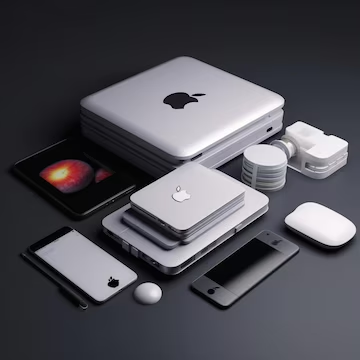In the realm of smartphones, Apple’s iPhone stands as a hallmark of innovation and quality. With its sleek design and cutting-edge technology, users may often wonder, “What companies is Apple using for iPhones?” The answer lies in an intricate and extensive supply chain. This network not only ensures each iPhone functions seamlessly but also upholds Apple’s reputation for excellence. In this blog post, we will explore the core components of an iPhone, the strategic relationships Apple builds with its suppliers, and how this impacts both quality and sustainability. For tech enthusiasts, iPhone users, and anyone considering their next smartphone purchase, this peek behind the curtain will offer valuable insights into the engineering marvel that is the iPhone.
The Core Components
The Processor
The beating heart of every iPhone is its processor—the Apple-designed A-series chip. Known for their performance and efficiency, these chips are a pivotal component crafted by Taiwan Semiconductor Manufacturing Company (TSMC). TSMC’s advanced manufacturing capabilities allow Apple to continually push the boundaries of what’s possible in smartphone performance. Their partnership ensures that each iPhone runs smoothly, handling tasks from simple browsing to complex computations with ease.
The Camera
When you think of capturing stunning photos and videos, the iPhone’s camera system comes to mind. Sony provides the image sensors for these cameras, which are renowned for their clarity and color accuracy. This collaboration allows Apple to consistently enhance its camera technology, offering features like low-light photography and cinematic video capabilities that remain industry benchmarks.
The Display
The vibrant Retina displays of iPhones are critical for providing users with a superior visual experience. Samsung and LG are key players here, supplying OLED and LCD panels that offer high resolutions, deep blacks, and vibrant colors. This partnership ensures that whether you’re gaming, watching movies, or simply reading an article, the display quality is second to none.
The Battery
Apple’s quest for a longer battery life has led them to partner with companies like Amperex Technology Limited (ATL) and LG Chem. These suppliers produce the lithium-ion batteries that power iPhones, enabling users to enjoy extended periods of use without frequent recharging. Their contributions are vital in ensuring that each iPhone maintains a balance of power, longevity, and safety.
The Supply Chain
Strategic Supplier Relationships
Apple’s supply chain is a testament to strategic partnerships and meticulous planning. By aligning with top-tier suppliers, Apple secures components that meet its rigorous standards. This network includes over 200 suppliers globally, ensuring that every part, from the smallest screw to the main logic board, is crafted to perfection.
Global Supply Chain Diversity
Apple’s suppliers span the globe, from TSMC in Taiwan to LG Displays in South Korea, creating a geographically diverse supply chain. This international collaboration not only supports Apple’s production needs but also fosters innovation amidst cultural and technological diversity. Each supplier brings expertise and precision, contributing to the unparalleled quality of iPhones worldwide.
Contributing to Quality and Performance
The diversity within Apple’s supply chain means that various manufacturing techniques and technologies are harnessed, resulting in high-performing devices. Suppliers often specialize in specific components, allowing them to focus on innovation and refinement. This specialization translates into iPhones that consistently deliver on performance, reliability, and customer satisfaction.
Quality Control and Sustainability

Maintaining High Standards
Apple’s commitment to quality is evident in its stringent quality control measures. Every component undergoes rigorous testing to ensure it meets Apple’s high standards before being integrated into an iPhone. This meticulous approach guarantees that each device operates flawlessly, providing users with a dependable and lasting product.
Sustainability Initiatives
Recognizing the environmental impact of technology production, Apple has implemented aggressive sustainability goals. By partnering with suppliers who share a commitment to sustainable practices, Apple aims to reduce its carbon footprint and promote responsible sourcing. From utilizing recycled materials to ensuring energy-efficient manufacturing processes, Apple’s suppliers play a crucial role in achieving these environmental objectives.
Impact on User Experience
Quality control and sustainability not only enhance product longevity but also elevate the overall user experience. Users enjoy devices that are not only built to last but are also produced with minimal environmental impact. This assurance strengthens Apple’s brand loyalty and attracts consumers who prioritize sustainable practices.
The Future of iPhone Technology
Upcoming Advancements
With each new iPhone release, Apple’s commitment to innovation shines through. The future holds exciting advancements, such as improvements in AI capabilities and augmented reality experiences. These innovations promise to redefine how users interact with their devices, offering more intuitive and immersive applications.
Potential New Suppliers
As Apple explores cutting-edge technologies, new partnerships may emerge. Companies specializing in AI, machine learning, and advanced sensor technology could become integral to iPhone production. These collaborations will likely drive the next wave of iPhone features, enhancing both functionality and user engagement.
Incorporating Emerging Technologies
Emerging technologies, such as foldable displays and 5G connectivity, present opportunities for Apple to expand its product offerings. By incorporating these technologies, Apple can maintain its competitive edge in the smartphone market, delivering devices that meet evolving customer expectations and technological trends.
Conclusion
The success of Apple’s iPhone lies in its intricate network of suppliers and the quality of its core components. By strategically partnering with industry leaders, Apple ensures each device meets its high standards for performance, reliability, and sustainability. This supply chain not only contributes to Apple’s reputation for excellence but also influences global technological advancements. For tech enthusiasts, iPhone users, and future smartphone buyers, understanding these dynamics highlights the importance of innovation and collaboration in producing world-class technology. We invite you to share your thoughts on Apple’s supply chain and stay tuned for the latest updates in iPhone technology.

